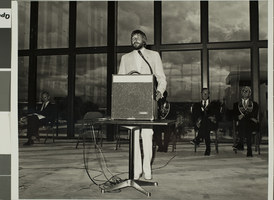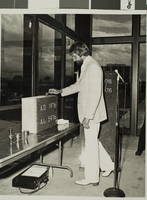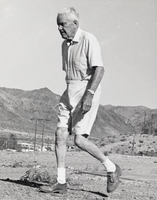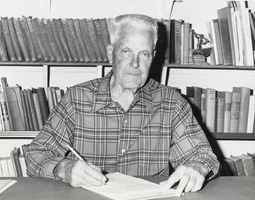Search the Special Collections and Archives Portal
Search Results

Photograph of Dr. Donald Baepler, Las Vegas, 1976
Date
Archival Collection
Description
Description provided with image: "Cornerstone ceremony for Artemus W. Ham Concert Hall and Juanita Greer White Hall, Dr. Donald Baepler."
Image

Photograph of Dr. Donald Baepler, Las Vegas, 1976
Date
Archival Collection
Description
Description provided with image: "Cornerstone ceremony for Artemus W. Ham Concert Hall and Juanita Greer White Hall, Dr. Donald Baepler."
Image
Dr. Vincent Richardson oral history interview
Identifier
Abstract
Oral history interview with Dr. Vincent Richardson conducted by Claytee D. White on October 12, 2021 for African Americans in Las Vegas: a Collaborative Oral History Project.
Vincent Richardson talks about his childhood growing up with his grandparents in Windsor Park. He reminisces about the community, his grandmother's cooking, and his house that had fantastic views of the Las Vegas Strip. Vincent also recalls when homes in Windsor Park began sinking, and how he and other neighbors were forced to react to their unsustainable building environments. Vincent discusses earning his PhD from the University of Nevada, Las Vegas and his employment history working as an Administrative Coordinator for the Clark County School District and an educator for the College of Southern Nevada.
Subjects discussed include: Annie Walker; Windsor Park; Wendell P. Williams; North Las Vegas City Hall meetings.
Archival Collection
Job #97-757: Dr. Shires, Dr. Samola for University of Nevada School of Medicine, 1997 October 02
Level of Description
Archival Collection
Collection Name: Greg Cava Photograph Collection
Box/Folder: Box 04
Archival Component
Kennedy, William, 1401 Strong Dr.; 1207 Strong Dr.; 2601 Burton Ave., 1955, 1962, 1963
Level of Description
Archival Collection
Collection Name: Elmo C. Bruner Architectural and Real Estate Appraisal Records
Box/Folder: Box 17
Archival Component

Dr. Deborah Kuhls oral history interview: transcript
Date
Archival Collection
Description
Oral history interview with Dr. Deborah Kuhls conducted by Barbara Tabach on December 29, 2017 for the Remembering 1 October Oral History Project. In this interview, doctor Deborah A. Kuhls describes the preparation and procedures implemented at the University Medical Center of Southern Nevada (UMC) during the night of the October 1, 2017 mass shooting in Las Vegas, Nevada. She describes her experiences from that night and into the next morning, starting from when the trauma center first learned about the shooting to when patients began arriving. She goes into detail on the hospital's Military-Civilian Trauma System Partnership, which allowed for the installation of a second trauma area to treat the large volume of patients. In addition to the events at the hospital, Kuhls talks about the flurry of activities during the week of the shooting, including interviews with various media, the statewide meeting for surgeons, fellows, and residents where "stop the bleed" training was provided, and general meetings with various government officials, including Donald Trump. Deborah Kuhls also discusses the emotional impact of the shooting and its aftermath as well as her goals for the future of trauma in the medical field.
Text
Dr. Robert Aalberts oral history interview
Identifier
Abstract
Oral history interview with Dr. Robert Aalberts conducted by Claytee D. White on November 16, 2006 for the UNLV @ 50 Oral History Project. In this interview Aalberts speaks about how he was encouraged to come to the University of Nevada, Las Vegas (UNLV) in 1991 by a friend who worked there. He described how when he first arrived there was no law school, and that he taught legal business and real estate courses. He became editor in chief of the Real Estate Law Journal in 1992. He also speaks about how he continues to teach, write, edit, do research in the new law library, and serve on various committees.
Archival Collection
Dr. Deborah Kuhls oral history interview
Identifier
Abstract
Oral history interview with Dr. Deborah Kuhls conducted by Barbara Tabach on December 29, 2017 for the Remembering 1 October Oral History Project. In this interview, doctor Deborah A. Kuhls describes the preparation and procedures implemented at the University Medical Center of Southern Nevada (UMC) during the night of the October 1, 2017 mass shooting in Las Vegas, Nevada. She describes her experiences from that night and into the next morning, starting from when the trauma center first learned about the shooting to when patients began arriving. She goes into detail on the hospital's Military-Civilian Trauma System Partnership, which allowed for the installation of a second trauma area to treat the large volume of patients. In addition to the events at the hospital, Kuhls talks about the flurry of activities during the week of the shooting, including interviews with various media, the statewide meeting for surgeons, fellows, and residents where "stop the bleed" training was provided, and general meetings with various government officials, including Donald Trump. Deborah Kuhls also discusses the emotional impact of the shooting and its aftermath as well as her goals for the future of trauma in the medical field.
Archival Collection

Photograph of Dr. David Bruce Dill, circa 1970s
Date
Archival Collection
Description
Image

Photograph of Dr. David Bruce Dill, circa 1970s
Date
Archival Collection
Description
Image
